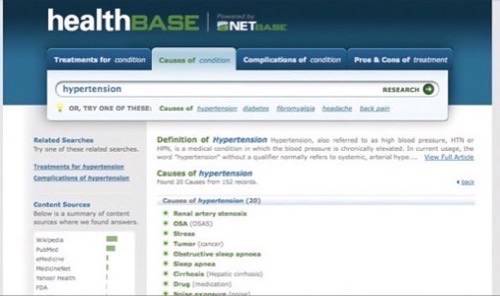We’ve all seen how semantic technologies improve search results, but rarely do we see those results put to use in such a targeted way. Jens Tellefsen, VP of Marketing and Product Strategy at NetBase Solutions spoke to ReadWriteWeb about today’s launch of healthBase – a medical search and discovery application. Using a variety of semantic indexing techniques, the company crawls the web’s leading medical and health players including the Mayo Clinic, PubMed (US National Library of Medicine) WedMd, Medical News Today and Discovery Health. What makes this a truly unique technology is that rather than requiring any data manipulation from humans, Netbase’s search results are completely automated.

Says Tellefsen, “Rather than using keywords or basic entities to search through billions of documents, NetBase can actually read and extract linguistic meaning from entire sentences and concepts.” According to Tellefsen, healthBase can determine causal relationships, treatments and conditions and automatically aggregate that data into meaningful answers. Given the fact that more than 75% of the population seeks out online health information, a semantic tool with sentence-level understanding can potentially help dispel medical myths on a massive scale.
NetBase employs the same principals across a variety of enterprise tools, but healthBase is its first foray into consumer-facing products. While the company is used to powering corporate, federal and market research, healthBase allows NetBase to show off its content intelligence tool in a way that gives us insight into our selves and our bodies.

Because NetBase is not reliant on manual annotation or custom taxonomies, the system is also very scalable. It took roughly 2 days to produce all of the data in healthBase – a feat that would never be possible by a combination human and machine system.
“It’s important for us to address real issues with semantic technologies outside of a lab,” Says Tellefsen. To try healthBase visit healthbase.netbase.com

















